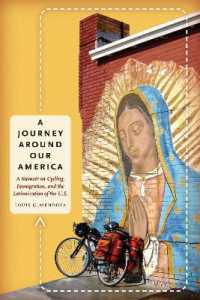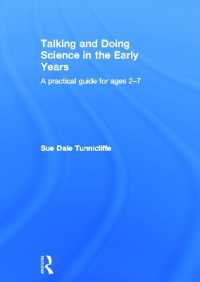Description
What is feminist transdisciplinary research? Why is it important? How do we do it? Through 19 contributions from leading international feminist scholars, this book provides new insights into activating transdisciplinary feminist theories, methods and practices in original, creative and exciting ways – ways that make a difference both to what research is and does, and to what counts as knowledge. The contributors draw on their own original research and engage an impressive array of contemporary theorising – including new materialism, decolonialism, critical disability studies, historical analyses, Black, Indigenous and Latina Feminisms, queer feminisms, Womanist Methodologies, trans studies, arts-based research, philosophy, spirituality, science studies and sports studies – to trouble traditional conceptions of research, method and praxis. The authors show how working beyond disciplinary boundaries, and integrating insights from different disciplines to produce new knowledge, can prompt important new transdisciplinarity thinking and activism in relation to ongoing feminist concerns about knowledge, power and gender. In doing so, the book attends to the multiple lineages of feminist theory and practice and seeks to bring these historical differences and intersections into play with current changes, challenges and opportunities in feminism. The book’s practically-grounded examples and wide-ranging theoretical orbit are likely to make it an invaluable resource for established scholars and emerging researchers in the social sciences, arts, humanities, education and beyond.
Table of Contents
List of Figures
Acknowledgements
Contributors
1. Introduction
Christina Hughes
2. Walking as trans(disciplinary)mattering: A speculative musing on acts of feminist indiscipline
Carol A. Taylor
3. Critical disability studies and the problem of method
Ada S. Jaarsma
4. Historical interludes: The productive uncertainty of feminist transdisciplinarity
Asilia Franklin-Phipps
5. Powerful dressing: Artfully challenging sexism in the academy
Linda Knight, Emily Gray and Mindy Blaise
6. Listening to water: Situated dialogues between Black, Indigenous and Black-Indigenous feminisms
Fikile Nxumalo and Marleen Villanueva
7. The bathroom polemic: Addressing the ethical and political significance of transgender informed epistemologies for feminist transdisciplinary inquiry
Wayne Martino and Jennifer Ingrey
8. Performance practice and eco-feminism: A diffractive approach for a transdisciplinary pedagogy
Cara Berger
9. Living in the hyphens: Between a here, a there, and an elsewhere
Veena Balsawer
10. Caster Semenya: The surveillance of sportswomen’s bodies, feminism and transdisciplinary research
Belinda Wheaton, Louise Mansfield, Jayne Caudwell, Rebecca Watson
11. Womanist and Chicana/Latina feminist methodologies: Contemplations on the spiritual dimensions of research
Michelle Salazar Pérez & Cinthya M. Saavedra
12. Hear me roar: Sound feminisms and qualitative methodologies
Walter S. Gershon
13. Inter(r)uptions: Reimagining dialogue, justice, and healing
Anjana Raghavan
14. Moving with the folds of time and place: exploring gut reactions in speculative transdisciplinary research with teen girls’ in a post-industrial community
Gabrielle Ivinson and Emma Renold
15. Transition states: Chemistry educators engaging with and being challenged by matter, materiality and what may come to be
Kathryn Scantlebury, Anita Hussénius and Catherine Milne
16. Embodying critical arts-based research: Complicating thought/thot leaders through transdisciplinary discourse
Gloria J. Wilson
17. (Un)disciplined: What is the terrain of my thinking?
Susan Naomi Nordstrom
18. Sex: A transdisciplinary concept
Stella Sandford
19. Conclusion: The rusty futures of transdisciplinary feminism
Jasmine B. Ulmer
Index








